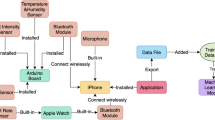Abstract
In this work, we use two well-established machine learning algorithms i.e., Random Forest (RF) and XGBoost, to predict ambient temperature for a baseband’s board. After providing an overview of the related work, we describe how we train the two ML models and identify the optimal training and test datasets to avoid the problems of data under- and over-fitting. Given this train/test split, the trained RF and XGBoost models provide temperature predictions with an accuracy lower than one degree Celsius, i.e., far better than any other approach that we used in the past. Our feature importance assessments reveal that the temperature sensors contribute significantly more towards predicting the ambient temperature compared to the power and voltage readings. Furthermore, the RF model appears less volatile than XGBoost using our training data. As the results demonstrate, our predictive temperature models allow for an accurate error prediction as a function of baseband board sensors.
Access this chapter
Tax calculation will be finalised at checkout
Purchases are for personal use only
Similar content being viewed by others
Notes
- 1.
sklearn.model_selection.train_test_split,
https://scikit-learn.org/stable/modules/generated/sklearn.model_selection.train_test_split.html).
References
3GPP: TS 22 261–v19.1.0 - 3rd generation partnership project; technical specification group services and system aspects; service requirements for the 5G system; stage 1 (release 19) (2022)
Al-Dulaimi, A., Wang, X., Chih-Lin, I.: 5G networks: Fundamental requirements, enabling technologies, and operations management (2018). https://doi.org/10.1002/9781119333142
Bates, S., Hastie, T., Tibshirani, R.: Cross-validation: what does it estimate and how well does it do it? (2022). https://doi.org/10.48550/arXiv.2104.00673
Breiman, L.: Random forests. Mach. Learn. 45(1), 5–32 (2001). https://doi.org/10.1023/A:1010933404324
Camps-Mur, D., et al.: AI and ML - enablers for beyond 5G networks (2021). https://doi.org/10.5281/zenodo.4299895
Chen, T., Guestrin, C.: XGBoost: a scalable tree boosting system. In: Proceedings of the 22nd ACM SIGKDD International Conference on Knowledge Discovery and Data Mining, pp. 785–794 (2016). https://doi.org/10.1145/2939672.2939785
Cheng, T., Du, H., Li, L., Fu, Y.: LSTM-based temperature prediction and hotspot tracking for thermal-aware 3D NoC system. In: 2021 18th International SoC Design Conference (ISOCC), pp. 286–287 (2021)
Chigurupati, A., Thibaux, R., Lassar, N.: Predicting hardware failure using machine learning. In: 2016 Annual Reliability and Maintainability Symposium (RAMS), pp. 1–6 (2016). https://doi.org/10.1109/RAMS.2016.7448033
Chih-Lin, I., Kukliński, S., Chen, T., Ladid, L.L.: A perspective of O-RAN integration with MEC, SON, and network slicing in the 5G era. IEEE Netw. 34, 3–4 (2020). https://doi.org/10.1109/MNET.2020.9277891
Cotta, J., Breque, M., Nul, L.D., Petridis, A.: Industry 5.0 towards a sustainable, human-centric and resilient European industry. European Commission Research and Innovation (R &I) Series Policy Brief (2021). https://doi.org/10.2777/308407,https://ec.europa.eu/eurostat/statistics-
Das, A., Mueller, F., Rountree, B.: Aarohi: making real-time node failure prediction feasible. In: 2020 IEEE International Parallel and Distributed Processing Symposium (IPDPS), pp. 1092–1101 (2020). https://doi.org/10.1109/IPDPS47924.2020.00115
Das, M.K., Rangarajan, K.: Performance monitoring and failure prediction of industrial equipments using artificial intelligence and machine learning methods: a survey. In: Proceedings of the 4th International Conference on Computing Methodologies and Communication, ICCMC 2020, pp. 595–602 (2020). https://doi.org/10.1109/ICCMC48092.2020.ICCMC-0000111
Durgam, S., Bhosale, A., Bhosale, V., Deshpande, R., Sutar, P., Kamble, S.: Ensemble learning for predicting temperature of heat sources for minimizing electronic failures (2021). https://doi.org/10.1109/ICNTE51185.2021.9487663
Escudero-Mancebo, D., Fernández-Villalobos, N., Óscar Martín-Llorente, Martínez-Monés, A.: Research methods in engineering design: a synthesis of recent studies using a systematic literature review. Res. Eng. Design 34, 221–256 (2023). https://doi.org/10.1007/s00163-022-00406-y
Ilager, S., Ramamohanarao, K., Buyya, R.: Thermal prediction for efficient energy management of clouds using machine learning. IEEE Trans. Parallel Distrib. Syst. 32(5), 1044–1056 (2021). https://doi.org/10.1109/TPDS.2020.3040800
Lyu, N., Jin, Y., Xiong, R., Miao, S., Gao, J.: Real-time overcharge warning and early thermal runaway prediction of li-ion battery by online impedance measurement. IEEE Trans. Industr. Electron. (2021). https://doi.org/10.1109/TIE.2021.3062267
Nisce, I., Jiang, X., Vishnu, S.P.: Machine learning based thermal prediction for energy-efficient cloud computing (2023). https://doi.org/10.1109/ccnc51644.2023.10060079
O’connor, P.D.: Arrhenius and electronics reliability. Qual. Reliab. Eng. Int. 5, 255 (1989). https://doi.org/10.1002/qre.4680050402
Ozceylan, B., Haverkort, B.R., Graaf, M.D., Gerards, M.E.: Improving temperature prediction accuracy using Kalman and particle filtering methods (2020). https://doi.org/10.1109/THERMINIC49743.2020.9420535
Peng, Y.H., Lee, C.M., Tung, K.Y., Chen, R.: Rack inlet temperature prediction based on deep learning (2022). https://doi.org/10.1109/ICMT56556.2022.9997747
Phuyal, S., Bista, D., Bista, R.: Challenges, opportunities and future directions of smart manufacturing: a state of art review. Sustain. Futures 2, 100023 (2020). https://doi.org/10.1016/J.SFTR.2020.100023
Prisacaru, A., Gromala, P.J., Han, B., Zhang, G.Q.: Degradation estimation and prediction of electronic packages using data-driven approach. IEEE Trans. Ind. Electron. 69(3), 2996–3006 (2022). https://doi.org/10.1109/TIE.2021.3068681
Spory, E.M.: Increased high-temperature IC packaging reliability using die extraction and additive manufacturing assembly (2016). https://doi.org/10.4071/2016-hitec-18
Vitucci, C., Sundmark, D., Jägemar, M., Danielsson, J., Larsson, A., Nolte, T.: Fault management framework and multi-layer recovery methodology for resilient system. In: Proceeding IEEE 6th International Conference on System Reliability and Safety (ICSRS), pp. 32–39 (2022)
Wang, N., Li, J.Y.: Efficient multi-channel thermal monitoring and temperature prediction based on improved linear regression. IEEE Trans. Instrum. Measur. 71, 1–9 (2022). https://doi.org/10.1109/TIM.2021.3139659
Wang, N., et al.: An enhanced thermoelectric collaborative cooling system with thermoelectric generator serving as a supplementary power source. IEEE Trans. Electron Devices 68(4), 1847–1854 (2021). https://doi.org/10.1109/TED.2021.3059183
Yang, X., Sang, Q., Wang, C., Yu, M., Zhao, Y.: Development and challenges of reliability modeling from transistors to circuits. IEEE J. Electron Devices Soc. (2023). https://doi.org/10.1109/JEDS.2023.3253081
Yao, X., Omori, M., Nishi, H.: Load balancing method using server temperature prediction considering multiple internal heat sources in data centers (2021). https://doi.org/10.1109/ICM46511.2021.9385604
Zhang, K., Ogrenci-Memik, S., Memik, G., Yoshii, K., Sankaran, R., Beckman, P.: Minimizing thermal variation across system components (2015). https://doi.org/10.1109/IPDPS.2015.37
Author information
Authors and Affiliations
Corresponding author
Editor information
Editors and Affiliations
Rights and permissions
Copyright information
© 2024 The Author(s), under exclusive license to Springer Nature Switzerland AG
About this paper
Cite this paper
Rahman, S., Olausson, M., Vitucci, C., Avgouleas, I. (2024). Ambient Temperature Prediction for Embedded Systems Using Machine Learning. In: Kofroň, J., Margaria, T., Seceleanu, C. (eds) Engineering of Computer-Based Systems. ECBS 2023. Lecture Notes in Computer Science, vol 14390. Springer, Cham. https://doi.org/10.1007/978-3-031-49252-5_3
Download citation
DOI: https://doi.org/10.1007/978-3-031-49252-5_3
Published:
Publisher Name: Springer, Cham
Print ISBN: 978-3-031-49251-8
Online ISBN: 978-3-031-49252-5
eBook Packages: Computer ScienceComputer Science (R0)




